
UTAR Lee Kong Chian Faculty of Engineering and Science (LKC FES) lecturer Ir Dr Tham Mau Luen's research project, titled “Context-Aware Disaster Mitigation using Mobile Edge Computing and Wireless Mesh Network” was selected for ICT Virtual Organization of ASEAN Institutes and NICT (ASEAN IVO) in 2020.
ASEAN IVO is a global alliance of ICT R&D institutes and universities in the ASEAN region and Japan. The mission of ASEAN IVO is to seek and identify strategic ICT research areas in the ASEAN region and promote collaborative projects with them.
A total of USD80,000 was awarded for the entire research project. The funding will be allocated yearly, with USD40,000 for the first year and another USD40,000 for the following year. The amount is subject to change based on National Institute of Information and Communications Technology’s (NICT) fiscal year budget situation and the duration of the grant awarded will take effect from April 2020 to March 2022.
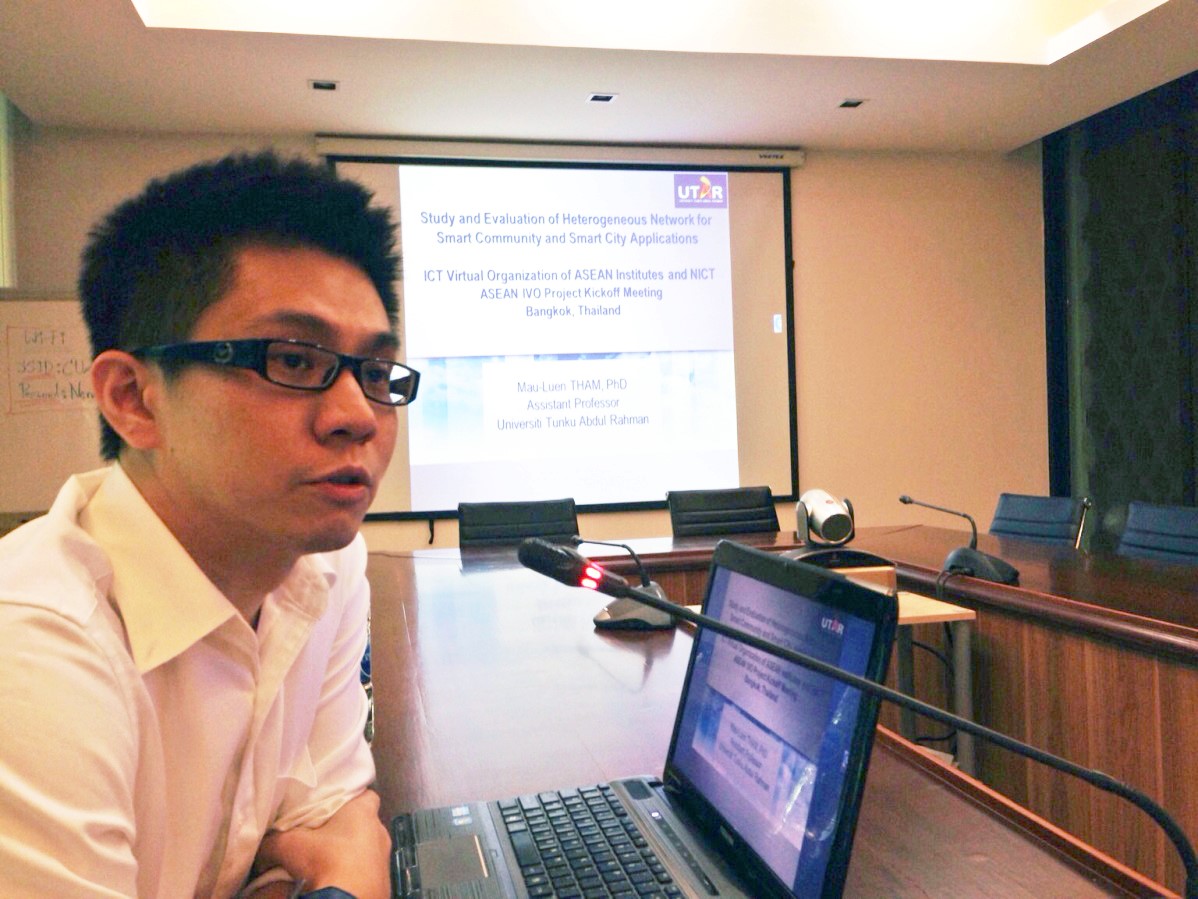
Dr Tham at ASEAN IVO 2017 meeting held in Bangkok, Thailand
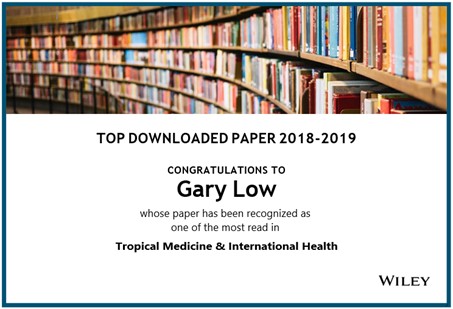
PhD graduate of UTAR Faculty of Medicine and Health Sciences Dr Gary Low Kim Kuan’s research paper was awarded the “Top Downloaded Paper 2018-2019” in the Journal of Tropical Medicine & International Health on 30 April 2020. His publication earned him a congratulatory certificate from the publisher, Wiley. The research paper was titled “Diagnostic accuracy and predictive value in differentiating the severity of dengue infection”. It aimed to review the diagnostic test accuracy and predictive value of statistical models in differentiating the severity of dengue infection. The paper was co-authored by Jackob Kagize, Katherine J. Faull and Aizad Azahar.
Dr Gary Low was a senior lecturer at UTAR from 2013 to 2018. He taught medical students who undertook Bachelor of Medicine and Bachelor of Surgery course and other Allied Health Sciences. He also had a research group called “STRIPED Study Group”. The group was working in the area of dengue infection. They were supported by the Multidisciplinary UTAR Strategic Research Funding Scheme (UTARSRF) from 2014 to 2018. The output of the grant resulted in numerous publication and the work was continued even after Dr Gary Low moved to Torrens University Australia in 2019.
UTAR Lee Kong Chian Faculty of Engineering and Science (LKC FES) Centre for Power Systems and Electricity Chairperson Ir Prof Dr Lim Yun Seng was granted The Newton Fund Impact Scheme (NFIS) for his research project titled “Development of IoT controlled virtual energy storage for maximum demand reductions under intermittency of photovoltaic systems”. The NFIS was granted by the British Council.
A total of £137,000 was awarded for the entire research project with the grant duration of a minimum of 12 months to a maximum of 18 months. The co-researchers of the research project were UTAR LKC FES lecturer Ir Dr Wong Jianhui and Faculty of Business and Finance lecturer Prof Dr Eng Yoke Kee. They were led by Prof Lim.

The research is titled “Development of IoT controlled virtual energy storage for maximum demand reductions under intermittency of photovoltaic systems”
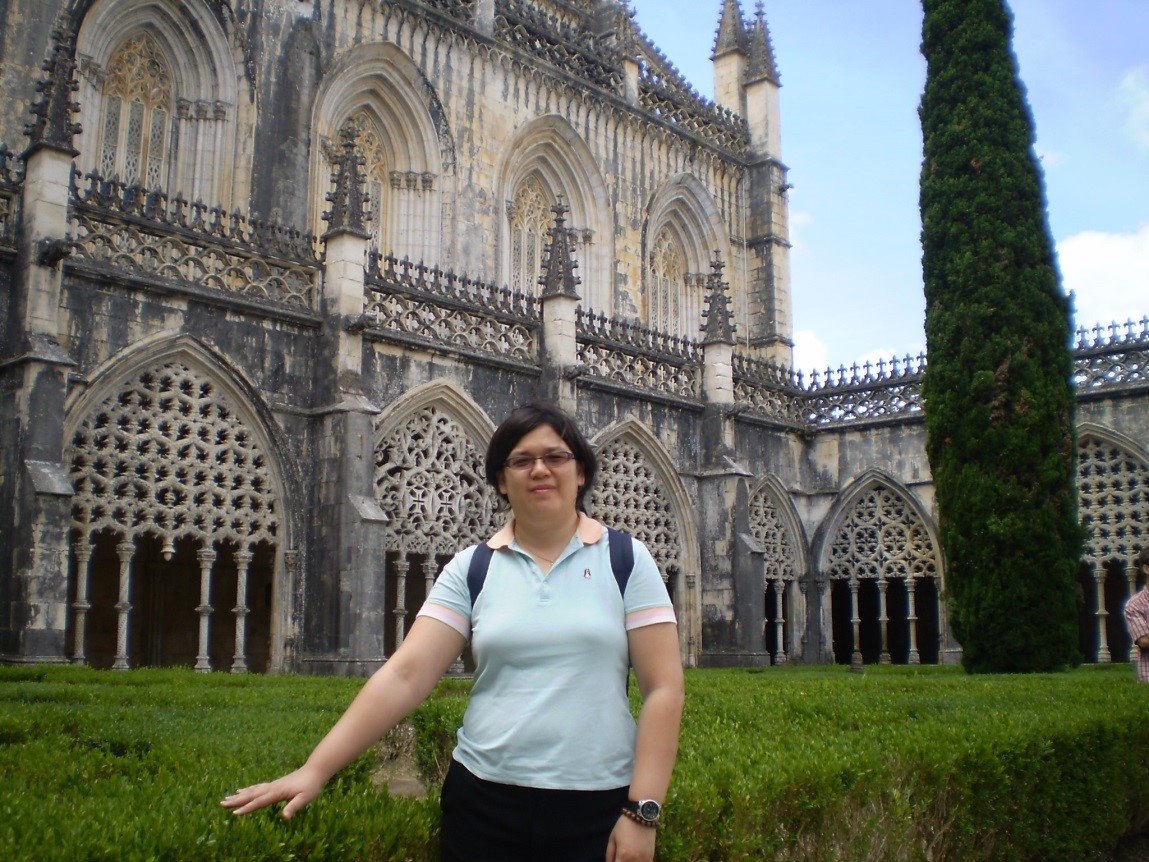
Assoc Prof Ir Dr Khoo Hooi Ling
UTAR academic-cum-researcher Assoc Prof Ir Dr Khoo Hooi Ling from Lee Kong Chian Faculty of Engineering and Science (LKC FES) was selected to be the recipient of the International Cooperative Research Activity (ICRA) Grant.
The grant, worth JP¥1,000,000, was allocated for two years (2020-2022) for the research topic titled “Shared Space Design and Modeling: Case Studies in Asian Cities”. It was funded by the Eastern Asia Society for Transportation Studies (EASTS-Japan) c/o Japan Transport and Tourism Research Institute.
In the year 2018, Dr Khoo established an international research group on “Shared Space Design and Modeling”. The research group was led by Dr Khoo with two other members, namely Dr Raymond Ong Ghim Ping from the National University of Singapore and Dr Hsu Yu-Ting from the National Taiwan University. All of them shared the same research interest in road design for non-motorized road users.
Dr Khoo’s research mainly aims to identify issues and challenges in shared space implementation; understand the design principles for shared space; review successful case studies on shared space design implementation; model drivers’/commuters’/cyclists’ behaviours with roadway facilities and understand the impact of shared space.
A team of academics from Lee Kong Chian Faculty of Engineering and Science (LKC FES), namely Dr Chee Pei Song, Prof Ts Dr Lim Eng Hock, Dr Lee Yong Hong, and Ir Danny Ng Wee Kiat, recently secured the Collaborative Research in Engineering, Science and Technology Centre (CREST) R&D grant. Faculty of Medicine and Health Sciences (FMHS) Deputy Dean for Academic Development and Undergraduate Programmes Prof Dr Ng Teck Han also joined the team to provide medical advice. The research is also an industry collaboration grant with MDT Innovations Sdn Bhd.
The grant, worth RM522,322.94, was allocated for 24 months (2021 – 2022) for the research project titled “Skin - alike and AI - driven Smart Biosensor - antenna for Monitoring ECG Signals”. The grant, which will also fund two postgraduate students and research facilities, will bring to light the multidisciplinary research works of integrating antenna and sensing technology into a wearable device with Artificial Intelligence (AI) features.
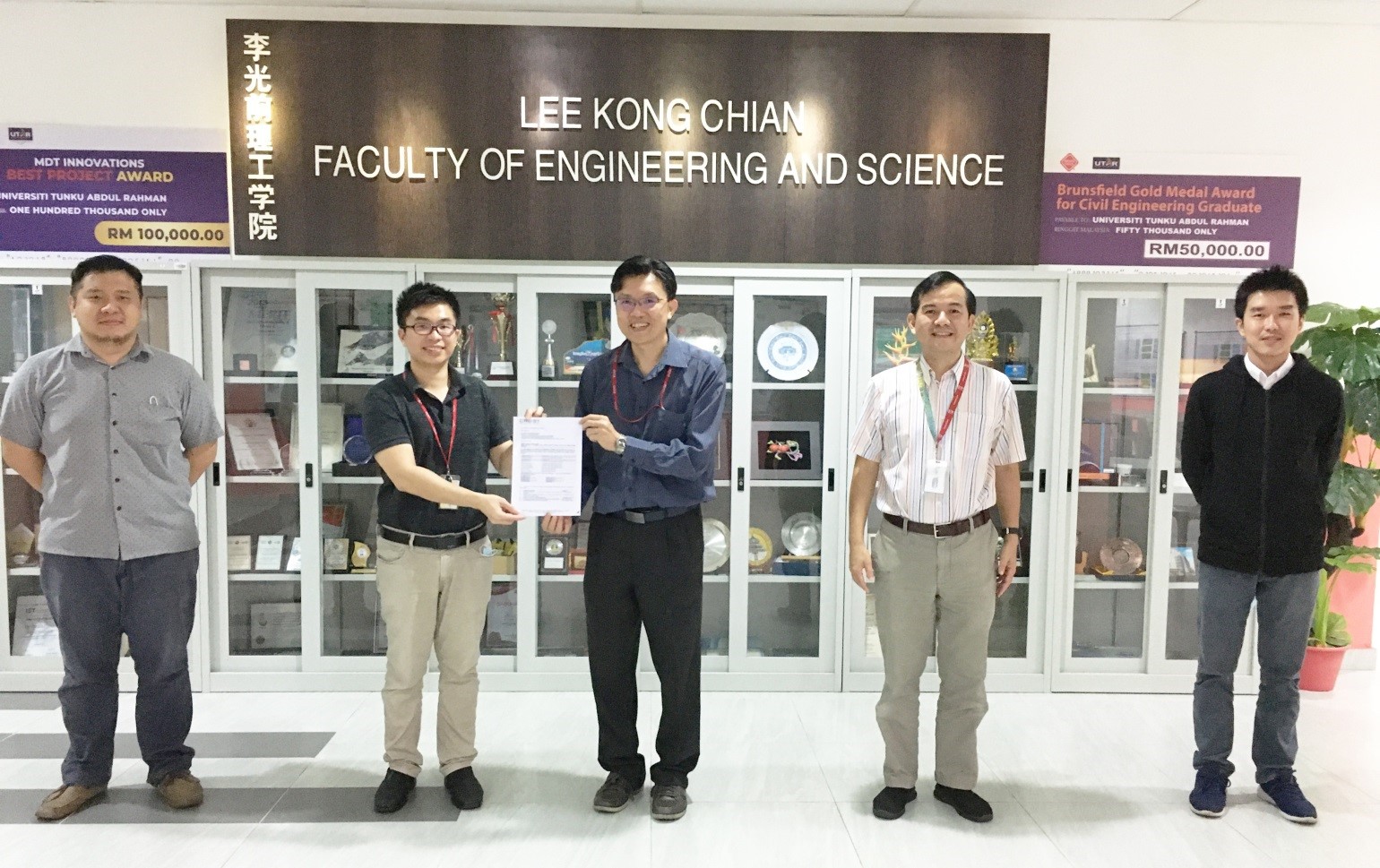
From left: LKC FES Deputy Dean for R&D and Postgraduate Programmes Assoc Prof Ts Dr Yap Wun She, Dr Chee, LKC FES Dean Prof Ir Dr Goi Bok Min, Prof Lim, and Dr Lee
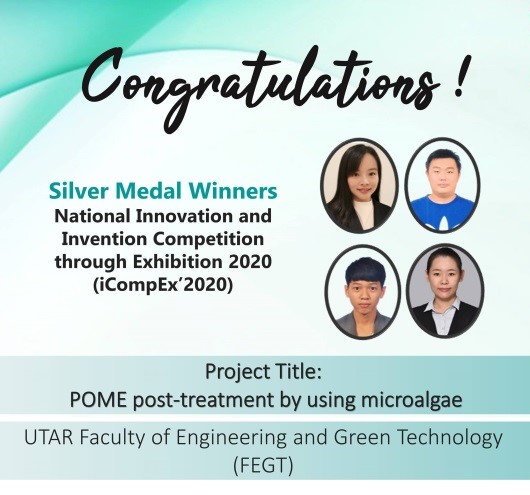
Inset from left: Dr Toh, Gaik Eng, Ang and Tan Khang
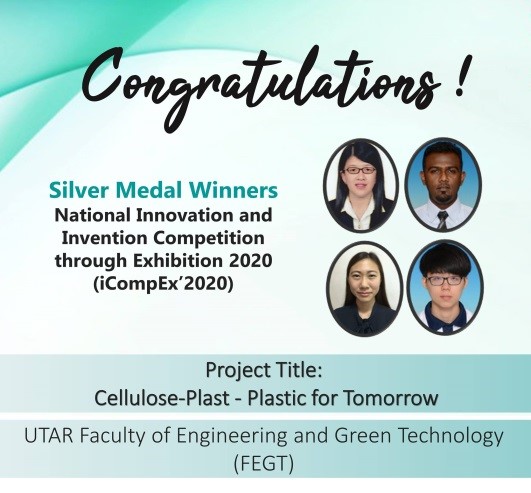
Inset from left: Dr Teoh, Dr Mathialagan, Ng and Diing
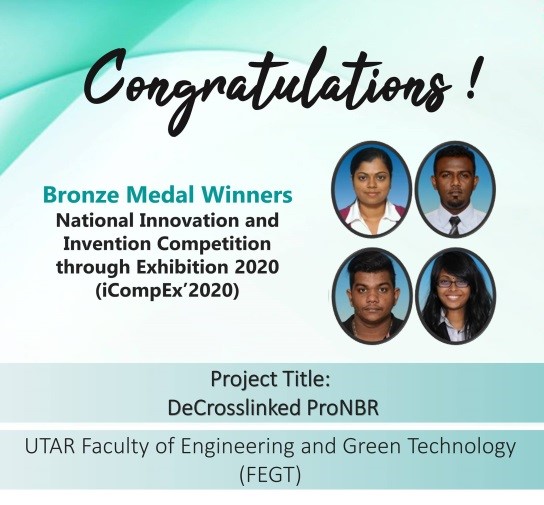
Inset from left: Dr Yamuna, Dr Mathialagan, Krishnaah and Patmashini Saii
UTAR Faculty of Engineering and Green Technology (FEGT) added yet another three awards to its growing list of accolades when it received two silver and one bronze medals at the National Innovation and Invention Competition through Exhibition 2020 (iCompEx’2020). The competition was organised by Politeknik Sultan Abdul Halim Mu’adzam Shah on 21 July 2020 via online.
The competition saw three teams participating from UTAR. This is the fifth participation by students of FEGT in this competition. The iCompEx’2020 is a competition and exhibition of innovation for new discovery. It also served as a platform for participants to highlight their research findings to the public.
The winning teams participated in two categories, namely Category B: Construction and Material, and Category G: Agriculture, Environment and Renewable Energy.
UTAR Faculty of Engineering and Green Technology (FEGT) academics, namely Institute of Postgraduate Studies and Research Deputy Director Assoc Prof Dr Sumathi Sethupathi, the lead researcher and her associate Department of Environmental Engineering Head Assoc Prof Dr Mohammed J. K. Bashir, Master by Research (Graduate) Muhammad Younas and other fellow contributors who are UTAR graduates Leong Loong Kong, Humayun Nadeem and Areeb Shehzad, were awarded “Energy & Fuels Top 25 Most Cited* Articles in 2016” for their research paper titled “Recent Advancements, Fundamental Challenges, and Opportunities in Catalytic Methanation of CO2”, published in 2016.
The recognition was given by Energy & Fuels Journal based on Clarivate Analytics for the August 2020 most cited articles. students learning experience and to facilitate industrial placement for both UTAR and Linyi University, China’s students.
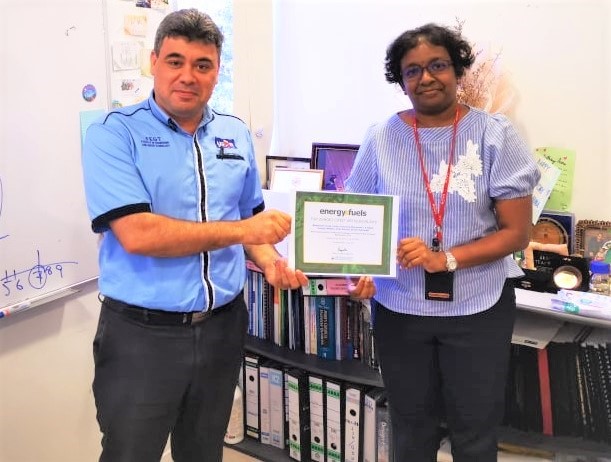
From left: Dr Bashir and Dr Sumathi displaying their certificate
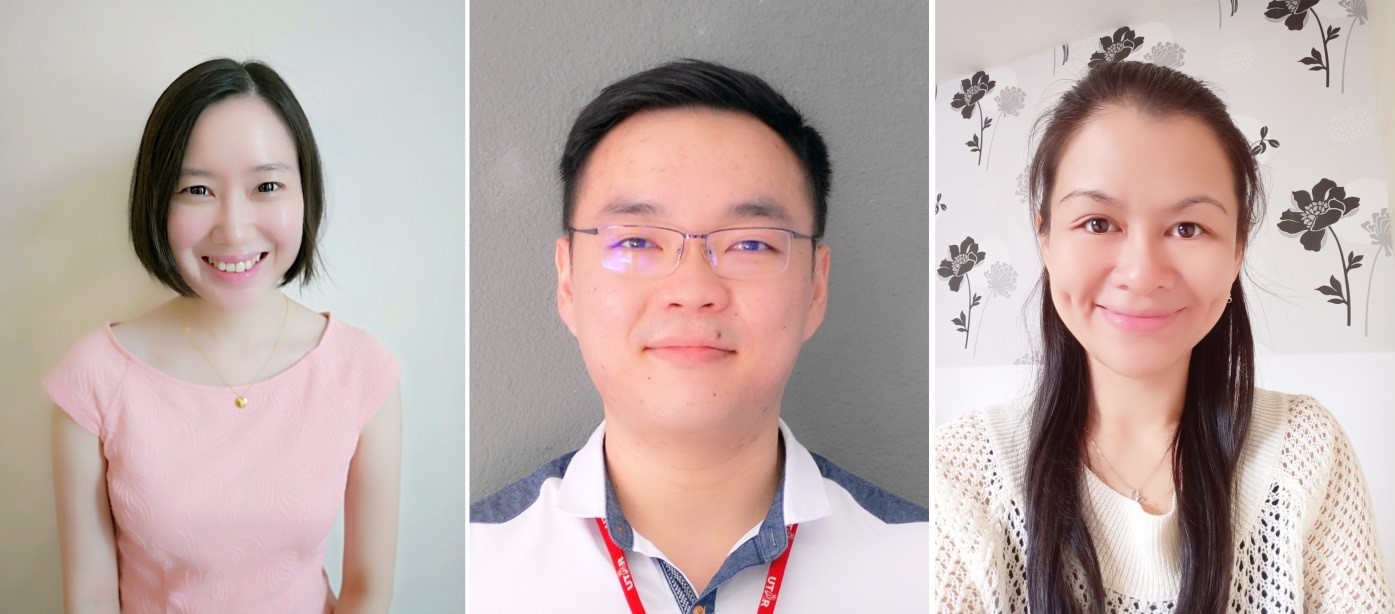
From left: Dr Lee, Hew and Dr Leong
Research papers by three academics from Faculty of Business and Finance, namely Assoc Prof Dr Lee Voon Hsien, Dr Leong Lai Ying and Hew Jun Jie, were recently awarded the “Hot Paper” and “Highly Cited Paper” awards for May/June 2020 by Clarivate Analytics.
The paper titled “Time to seize the digital evolution: Adoption of blockchain in operations and supply chain management among Malaysian SMEs” was awarded the “Hot Paper” and “Highly Cited Paper” awards. It was co-authored by Dr Leong and Hew, with UCSI academics Dr Garry Tan Wei Han and Prof Ooi Keng Boon, and Xiamen University Malaysia academic Dr Wong Lai Wan.
This paper was published in the International Journal of Information Management. It was cited for 14 times in total according to the Web of Science database. Getting the “Hot Paper” award indicates that this paper has earned enough citations in the most recent bimonthly period to place it in the top 0.1% when compared to papers in the same field (i.e., Social Sciences, general) and added to the database in the same period.
Meanwhile, the paper titled “Mobile social tourism shopping: A dual-stage analysis of a multi-mediation model” was awarded the “Highly Cited Paper” award. It was co-authored by Dr Lee, Dr Leong, and Hew, with Prof Ooi and Dr Tan.
Published in the Tourism Management, the paper received 39 citations in total according to the Web of Science database, qualifying it to be placed in the top 1% of the academic field of “Social Sciences, general” based on a highly cited threshold for the field and publication year, as well.
Three academics-cum-researchers from UTAR were ranked among the top 2% of scientists in the world by Stanford University, USA. The researchers were Emeritus Prof Dr Boo Nem Yun @ Mooi Nam Ying from the Faculty of Medicine and Health Sciences, and Assoc Prof Ts Dr Bernard Saw Lip Huat and Dr Pang Yean Lin from the Lee Kong Chian Faculty of Engineering and Science.
Prof Boo was ranked for her research publication citation for the subject of pediatrics under the subfields of general and internal medicine for the year 2019, and life time contribution (as career scientist) in pediatrics research up to the year 2020. She enthused, “I feel honoured to be ranked among the top 2% of scientists in the subject of Pediatrics in the world. I hope that this recognition will help me and my collaborators to obtain research grants more smoothly in the future for our research on the care of newborn babies, particularly jaundice diseases in Malaysian newborns, which has always been my main area of interest and research all these past years.”
Dr Saw was ranked for his research publication citation for the subject of energy under the subfields of mechanical engineering and transports for the year 2019. He said, “I am pleased and honoured to be featured in the list of top 2% scientists by Stanford University. A very special thanks to my supervisors, collaborators, colleagues and research funding supporters from UTAR and Malaysia government—Ministry of Science, Technology and Innovation (MOSTI) and Ministry of Higher Education for guiding and motivating me on the path to success.” He added, “I hope that this ranking will help to attract more research funding to the university especially on the energy related research work. I will continue to work hard and produce impactful research output that will benefit the larger community.”
Last but not the least, Dr Pang was selected for her research publication citation for the subject of general physics and energy for the year 2019.
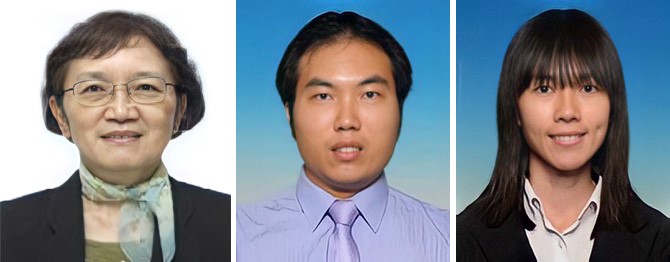
From left: Prof Boo, Dr Saw and Dr Pang
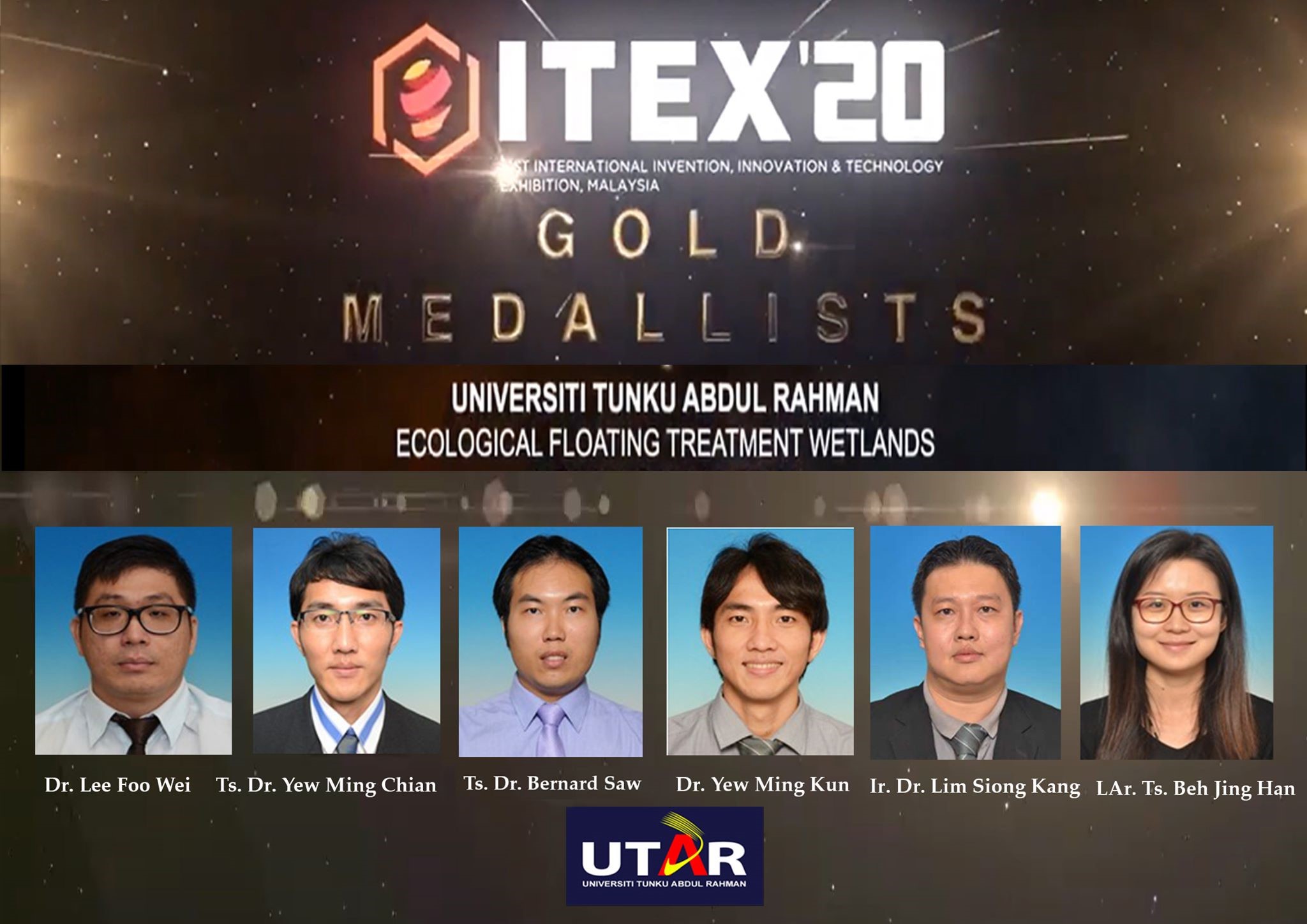
The winning team from UTAR LKC FES
UTAR Lee Kong Chian Faculty of Engineering & Science (LKC FES) academics added another award to their growing list of accolades when they received a gold medal and a certificate under the Building and Construction category at the 31st International Invention, Innovation & Technology Exhibition (ITEX) 2020.
The international exhibition was virtually organised by the Malaysian Invention and Design Society (MINDS) from 20 to 21 November 2020. ITEX 2020 featured a community of inventors and a virtual sourcing marketplace for commercialisation purposes within the fingertips. This platform provided a digital environment to cultivate innovative inventions, technologies and products, besides gathering innovators, inventors and researchers for new investments and commercialisation to stay ahead of the industry.
The winning team members consisted of LKC FES lecturers, namely Dr Lee Foo Wei, Ts Dr Yew Ming Chian, Assoc Prof Ts Dr Bernard Saw Lip Huat, Assoc Prof Ir Dr Lim Siong Kang and LAr Ts Beh Jing Han. They were led by LKC FES lecturer Dr Yew Ming Kun.
Their winning project was titled “Ecological Floating Treatment Wetlands”. The project aimed to investigate the floating type of lightweight foam concrete technique combination with greening technique to construct Ecological Floating Treatment Wetlands (EFTWs).
Lee Kong Chian Faculty of Engineering and Science (LKC FES) Ir Prof Dr Lim Yun Seng won the Malaysia Toray Science Foundation (MTSF) Science and Technology Award for the year 2020. Prof Lim was selected as one of the two recipients of the MTSF’s Science and Technology Award which came with a cash prize of RM30,000 each. This award is given to two deserving Malaysian scientists/researchers each year in recognition of his/her outstanding achievements/discoveries/contributions in Science and Technology. The co-winners of the award were Dr Chua Kein Huat and Ir Dr Wong Jianhui. The award was based on the innovative research work on “Innovative Controllers of Energy Storage System for Solving Energy Trilemma (A Smart Grid Technologies)”.
Through the funding received from the government and British Council (AAIBE, CREST and Newton Fund), Prof Lim and his team successfully built the first working utility-scale grid-integrated Energy Storage System (ESS) at the rating of 400 kW and 780 kWh in Malaysia on UTAR Campus (commercial building) under a real operating environment. A number of new controllers were developed to reduce the daily peak demands of the building under the intermittent power output of renewable energy sources as well as solving power quality issues caused by the penetration of photovoltaic systems.
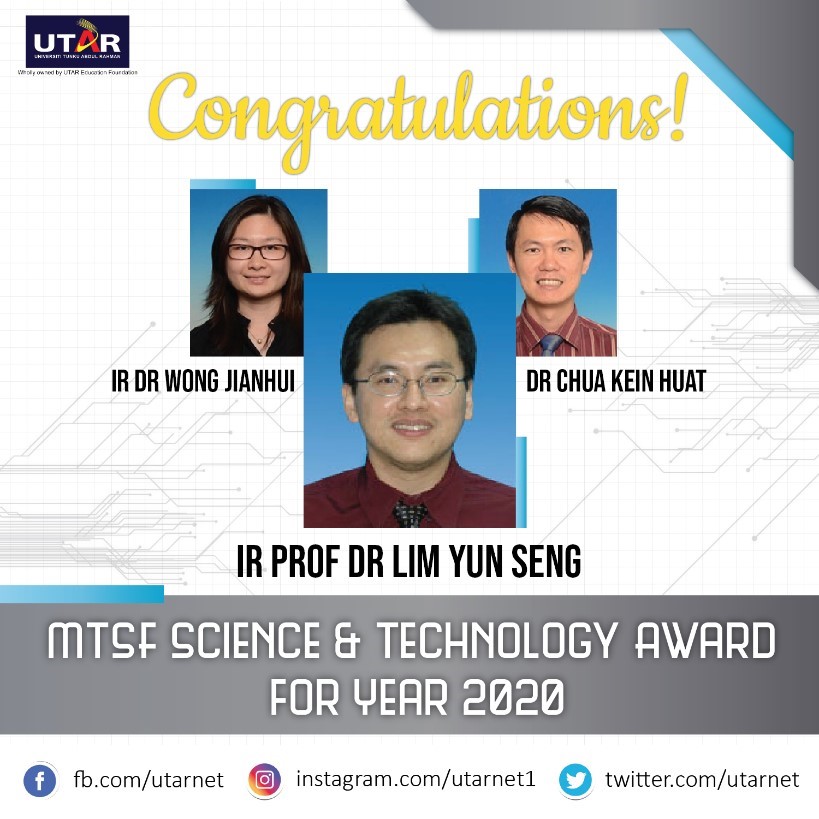
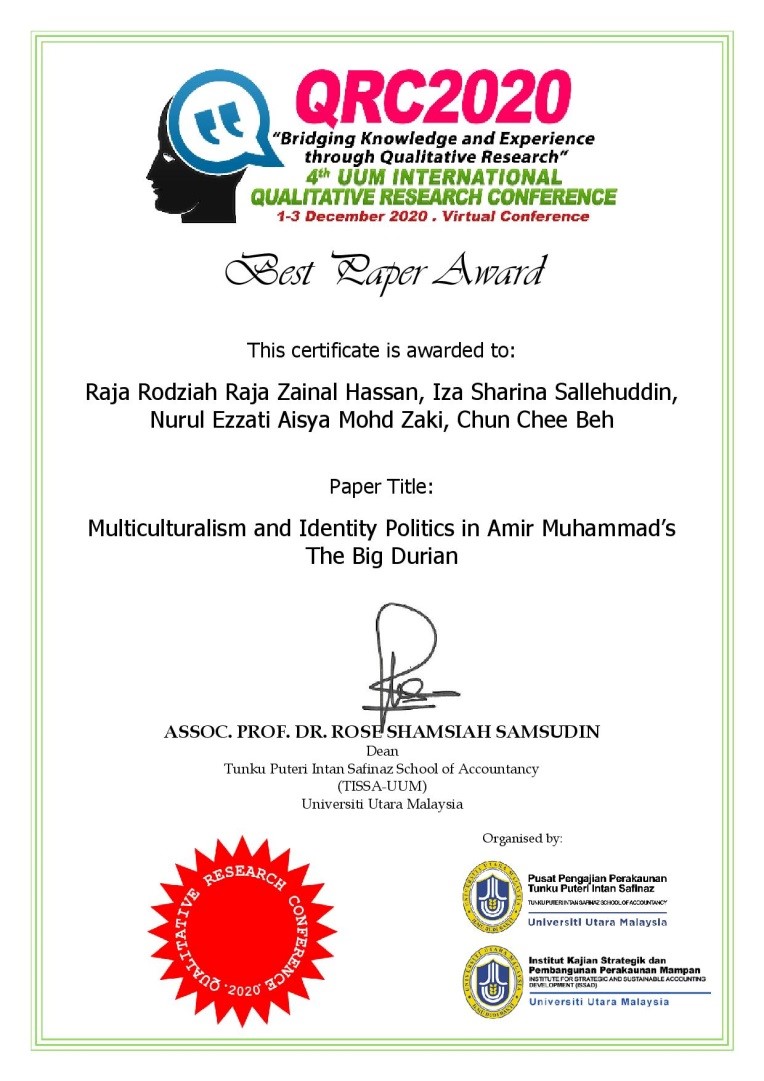
Certificate received by the team
A paper by four lecturers, namely Raja Rodziah binti Raja Zainal Hassan, Iza Sharina binti Sallehuddin, Nurul Ezzati Aisya binti Mohd Zaki, and Beh Chun Chee from UTAR Faculty of Creative Industries (FCI) was awarded the Best Paper Award at 4th UUM International Qualitative Research Conference (QRC 2020). The conference was held virtually by Universiti Utara Malaysia (UUM) from 1 to 3 December 2020.
The paper titled “Multiculturalism and Identity Politics in Amir Muhammad’s The Big Durian” discussed the political documentary “The Big Durian” directed by Amir Muhammad in 2003. According to the paper, the film is described as groundbreaking as it questions the mainstream representation of the Malaysian history. The success of The Big Durian, including being the first Malaysian film to be screened at the Sundance Film Festival, has led to several studies on Malaysian independent cinema and politics. The documentary film presented history in a way it gave ‘voice’ to many different perspectives. The Big Durian offers an insight into Malaysian historical past and takes a look at how Malaysians are still struggling with their identity to the present day. This study aimed to reveal how the film raises important questions about identity politics and multiculturalism in Malaysia based on the cultural memory framework.
UTAR R&D Colloquium 2020 was organised by the Institute of Postgraduate Studies and Research (IPSR) on 21 November 2020 via Microsoft Teams. The annual event was first held in May 2014. Due to the Covid-19 pandemic, the IPSR decided to organise the colloquium through a virtual platform this year.
The objective of the colloquium was to serve as a platform for all researchers to share their research ideas and enhance more cross-disciplinary research collaborations among the research centres in UTAR. The initiative is in line with one of the action plans devised under Focus Area 3: Research and Development of the UTAR’s 10-year Strategic Plan 2013-2022 (i.e. Strengthening of Cross Disciplinary Research Centres).
In his opening speech, UTAR Vice President for R&D and Commercialisation Prof Dr Faidz bin Abd Rahman welcomed the participants and said, “Exchanging ideas is the key to successful research. The colloquium is one of the platforms that the University creates for our researchers from various backgrounds to come together to meet, present, discuss and brainstorm on the things we can do together to help or give impact to the community which in line with the University’s vision —‘to be a global university of educational excellence with transformative societal impact’. Currently, we are in the year where we go head to head with the pandemic, and it has been a very challenging year for R&D because the R&D activities had to be stopped or paused because of the restriction in our movement. UTAR R&D Colloquium is usually organised twice per year, but unfortunately due to the pandemic, we have to cancel the physical colloquium which tentatively took place in April/May.
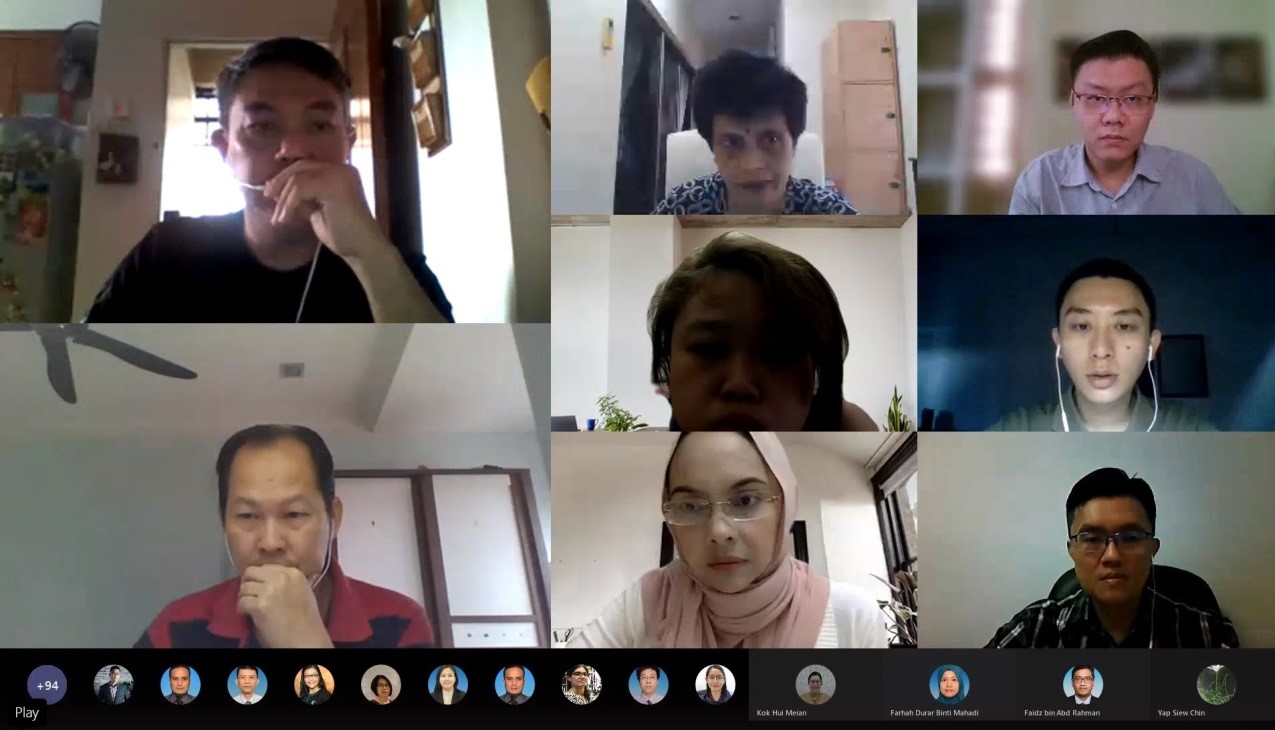
Group photo of some participants
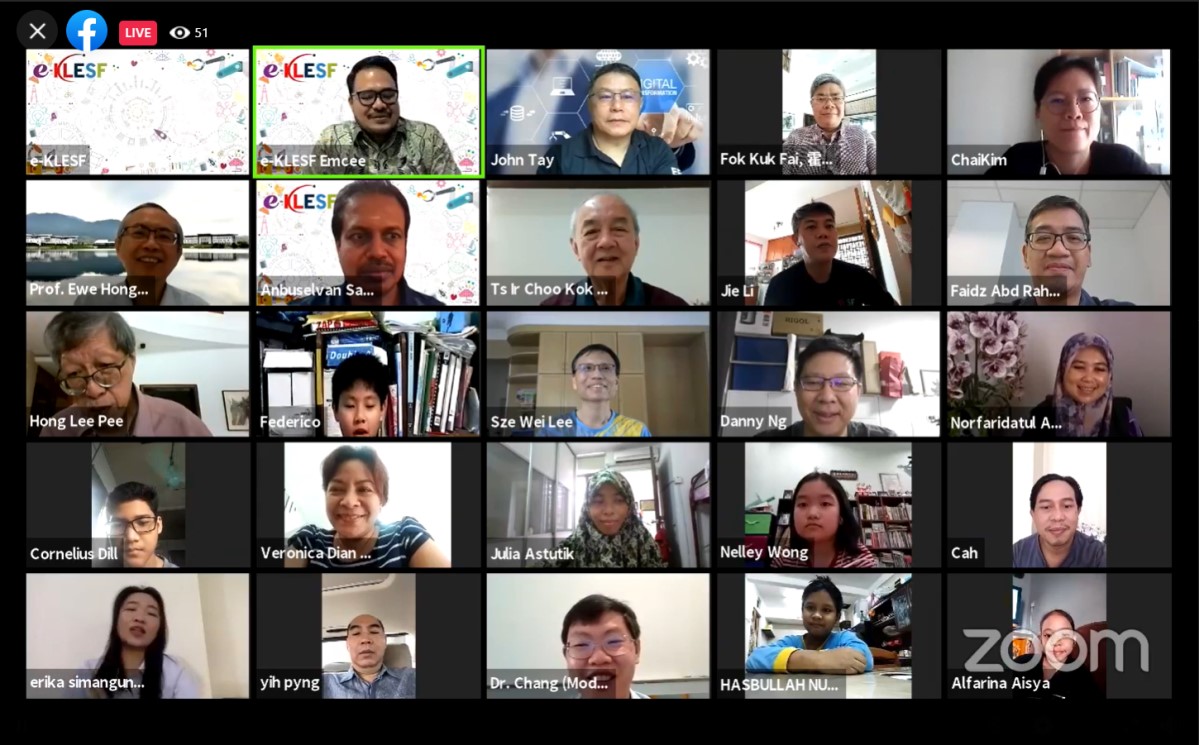
From left: Dr Huang, Dr Gong, Prof Zhao, Dr Chong, Prof Yow, Prof Wang, Dr Lai, Prof Cheng, Dr Chin and Dr Ho
In view of the Covid-19 pandemic and the standard of procedures by the government, this year's Kuala Lumpur Engineering Science Fair (KLESF) goes virtual for the first time. The opening ceremony of e-KLESF 2020 took place on 12 December 2020, hosted at Zoom and shared at Facebook saw more than 2,600 views. The engineering science fair which takes place from 12 until 20 December 2020 is an initiative with various programmes and activities that aims to promote interest in science, technology, engineering and mathematics (STEM) among primary and secondary school students. e-KLESF hopes to generate an interest in and excitement about STEM for students, the general public and parents as well as participants from other economies. The e-KLESF 2020 was organised by AAET, UTAR, MIGHT, IEM, MCMC and TAR UC, and supported by the Academy of Sciences Malaysia (ASM), Ministry of Education (MOE) Malaysia, the Associated Chinese Chambers of Commerce and Industry Malaysia (ACCCIM) and Malaysian Institute of Physics (IFM).
Academician Emeritus Professor Dr Cheong Soon Keng was appointed 2021 Senior Fellow of the Academy of Sciences Malaysia in recognition of his leadership in medical education and research, particularly in haematology and stem cell transplantation.
The 2021 Senior Fellows and Fellows were elected and appointed at the Academy of Sciences Malaysia’s 26th Annual General Meeting on 24 April 2021.
According to The Academy of Sciences Malaysia, a Fellow is an individual with outstanding achievement and contribution in the areas of science, engineering, technology or social sciences and humanities. Fellows are elected for life based on their scientific and scholarly achievements and are regarded as being of exceptional merit and distinction.
The criteria of appointment as Senior Fellows in the Academy of Sciences Malaysia are as follows:
Prof Cheong has been involved in research on stem cells for many decades. In early 2000, Prof Cheong became interested in Mesenchymal Stem Cells (MSCs) found in the human bone marrow, MSCs were first isolated and developed in his laboratory for clinical use for the first time in Malaysia. These MSCs are now undergoing clinical trials in collaboration with industry partners.
In the 2010s, Prof Cheong’s research group in UTAR was the first to generate Induced Pluripotent Stem Cells (iPSC) in Malaysia. This technology was first reported in 2006 and the discoverer, Dr Shinya Yamanaka was conferred the Nobel Prize in 2012. Prof Cheong’s research group was able to generate iPSC-cancer cell lines for disease modelling and drug discovery. iPSC-cancer cell lines successfully generated included the iPSC-myeloid leukaemia, iPSC-osteosarcoma, iPSC-oral squamous cell carcinoma, and iPSC-colonic carcinoma. Using virus-free, serum-free techniques, the research group was also able to establish clinical-grade, GMP-compliant normal iPSC cell lines from normal skin cells and haemopoietic stem cells. These mother cells can be used for future differentiation into the intended mature cell type for regeneration and repair. These generated IPSC clones are now cryopreserved in liquid nitrogen tank and being trade-marked for distribution purpose from 2020.
Prof Cheong’s career in Malaysia started when he returned from the UK in 1980 and joined Universiti Kebangsaan Malaysia (UKM). He was the sole clinical haematologist providing clinical service under UKM to Kuala Lumpur General Hospital for 17 years until the establishment of Hospital UKM in 1997 where he continued his medical professional practice. He was responsible for setting up the clinical haematology services in the new UKM teaching hospital at Bandar Tun Razak, Cheras. He also introduced the first haematology and oncology day care centre which was established in 1997. The concept of day care was so successful that this service was subsequently emulated by other specialties.
He was instrumental in setting up the PPUKM-MAKNA Cancer Centre, which was established in 1998, a collaboration between UKM and MAKNA which continues to date. He was Head of the Centre until his retirement from UKM and continues to support the collaboration as Vice-President of MAKNA.
The first haemopoietic stem cell transplantation for hospital UKM was carried out in 1999. Prof Cheong pioneered a new approach in stem cell transplantation using peripheral blood stem cells rather than the bone marrow, and the non-myeloablative conditioning regimen. This approach has extended the age limit of the recipients of transplantation from the standard 45 years as a cut off, benefitting the elderly patients up to 65 years or more. Today, the transplant centre in HUKM continues to conduct about 20 transplants a year with support from MAKNA. Since its inception, the centre, which is now known as Cell Therapy Centre, has successfully conducted more than 300 transplants. After retirement from UKM, Prof Cheong continues to participate in cell-based clinical trials carried out in this centre, until today.
Professionally, Prof Cheong has numerous notable accomplishments. In 1994, he was one of the Founding Council Members of the National Cancer Council (MAKNA), a not-for-profit charity organisation, setup up to fight cancer and help cancer patients. He was elected in 1997 as Vice-President of MAKNA and has been holding this post since then.
He was also responsible for the research arm of MAKNA. More than RM 15 million had been dispersed over 2 decades to support research programmes undertaken by different research groups nationwide. In 2001, the MAKNA Cancer Research Award for young scientists below the age of 40 years was established in collaboration with the Academy of Sciences of Malaysia. To date, many young scientists (more than 60) has been funded through this scheme. He also regularly assists in the dispersal of fund from a bursary programme to needy cancer patients to help them overcome financial hardship and purchase expensive equipment or non-formulary drugs needed for cancer treatment.
Prof Cheong retired from Universiti Kebangsaan Malaysia (UKM) in 2005 while holding the post of the Founding Head of the Laboratory Diagnostic Services, as well as Founding Head of the Clinical Haematology & Haemopoietic Stem Cell Transplant Services of the UKM Medical Centre. In 2007, he was conferred Emeritus Professor by UKM.
In 2008, he was elected as President of the College of Pathologists, Academy of Medicine of Malaysia (CPathAMM). He initiated the International Congress of Pathology & Laboratory Medicine which is now held biennially. He had also established the MCPath QAP Sdn Bhd under the College in 2013 to provide external quality assurance programme (McQAS) for diagnostic pathology laboratories and support the national drive for laboratory accreditation under ISO15189, which is still voluntary at this stage.
In 2009, Prof Cheong was invited to be the Founding Dean of UTAR Faculty of Medicine & Health Sciences, a post he has held until now.
In 2011, he was elected as Fellow of the Academy of Medicine, Singapore (FAMS), and Founding Fellow of the Faculty of Sciences for clinical scientists, Royal College of Pathologists of Australasia (FFScRCPA).
In November 2017. Prof Cheong was appointed by the Minister of Health as an Appointed Member of the Malaysian Medical Council, which is a corporate entity under the revised Medical Act 1971 and the regulator of the medical profession. In August 2018, he was further appointed as Chairman of the Preliminary Investigation Committee 2 which looks into the complaints by the public against the doctors.
UTAR congratulates Prof Cheong on this significant appointment and wishes him even greater successes and achievements in the years ahead.
